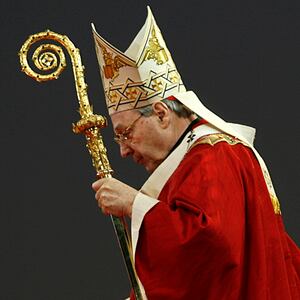Cardinal George Pell, once the third-most powerful man in the Catholic Church, has been sentenced to six years in prison for sexually abusing two choirboys—but he still hasn’t been punished by the Vatican.
In December, an Australian jury convicted Pell of one count of sexual penetration of a child under 16 and four counts of indecent acts with a child for the crimes in Melbourne’s St. Patrick Cathedral in 1996.
During the sentencing—broadcast live Wednesday morning Australian time, in contrast to a gag order that blocked reports on the trial—Judge Peter Kidd said Pell’s “offending was breathtakingly arrogant.”
“You breached that trust and abused your power,” he said in a packed courtroom, with protesters holding signs outside.
In excruciating detail, Kidd described how Pell cornered the boys in the cathedral sacristy after they drank some Communion wine, began pleasuring himself under his robe and then forced one of them to perform oral sex while they were “crying and sobbing.” He then fondled one of the boys at a later date.
The judge rejected a claim by Pell’s lawyer that he must have been out of his mind to molest the children in an unlocked room, saying the cardinal was just confident the boys would not run away from such a powerful figure.
“At some point in the episode, you even told your victims to be quiet because they were crying,” Kidd said. “What you did was so egregious, it is fanciful to suggest you may not have appreciated it.”
But Kidd also said that he believed that Pell had “effectively reformed,” was not a danger to the community, and was in such bad health that he might die in jail.
"You may not live to be released from prison," Judge Peter Kidd said as he sentenced Pell.
The six-year sentence means Pell—who will be registered as a sex offender for the rest of his life—must serve three years and eight months in prison before he is first eligible for parole.
During an earlier bond hearing, Pell’s then-lawyer Robert Richter classified the prelate’s crimes as “no more than a plain vanilla sexual penetration case where the child is not actively participating.” Richter later apologized for the remarks and stepped down as the cardinal’s attorney.
Pell is also facing a civil lawsuit by the alleged victim in another case that was scheduled for a second trial that was scrapped last month. The unnamed plaintiff alleges that Pell abused him in a swimming pool and bathhouse in the 1970s in Ballarat. The man is suing the trustees of the home where he stayed, the Australian state of Victoria and the archdiocese of Melbourne, in addition to the cardinal.
The judge stressed that the sentence he handed down was based only on the allegations by the two boys in the sacristy incident and not allegations by others or the larger clerical abuse scandal.
“You are not to be made a scapegoat for any failing or perceived failing by the Catholic Church,” he said, before going on to admonish victims of abuse by other clergy against drawing a larger message from the sentencing.
“This is not a vindication of your trauma,” he said. “For me to punish Cardinal Pell for the wrongs committed against you would be contrary to the rule of law.”
At a mass last week, Archbishop Anthony Fisher asked parishioners in Sydney not to be “too quick to judge” the cardinal. “I urge people not to draw any final conclusions until the appeal judges have had their chance to review this matter,” he said, according to Crux Catholic website. “If we are too quick to judge, we can end up joining the demonizers or the apologists, those baying for blood or those in denial.”
Pell was placed on a leave of absence from his role as the chief of the Vatican’s Secretariat For the Economy in Rome back in June 2017 as he fought the criminal charges in Australia; his mandate was not renewed in February 2019.
Before the criminal case, the prelate was found complicit in covering up clerical sex abuse by the Australian Royal Commission into Institutional Responses to Child Sexual Abuse in 2016. Rumors that he perpetrated sex abuse on young boys in the 1970s and 1990s have dogged Pell for nearly a decade. He continues to proclaim his innocence.
On the eve of the sentencing, the Vatican still did not appear to be taking the conviction seriously. They have opened an investigation with the Congregation for the Doctrine of the Faith, which would ultimately have the power to defrock him. But they say they will “withhold judgement” on the prelate until his appeal is heard June 5 and 6.
As such, Pell still retains the red cap bestowed on the cardinals, who are often referred to as the princes of the church. He still has a coveted place in the college of cardinals, whose primary role is to vote in a conclave should the necessity to elect a new pope arise. He will retain that role until he turns 80 or the Vatican defrocks him. If a conclave were held before either of those happen, he would be the first cardinal to miss one because of a jail sentence.
Pell is seen as a symbol of the systematic clerical sex abuse scandal that has gripped the Catholic Church in recent years. His fall from grace follows that of American former cardinal Theodore McCarrick, who was defrocked in February amid widespread allegations of abuse over decades. Last week, Cardinal Philippe Barbarin of Lyon, France, became another high-ranking church official to be convicted of crimes relating to sex abuse. The first cardinal ever to be found guilty in a secular court of covering up abuse, he was given a six-month suspended sentence.
From the moment he was charged with the sex abuse crimes, apologists for the cardinal have rallied around him, sure that he is a scapegoat for the greater crimes of the Catholic Church.
But the biggest apologist may be the pope himself, who has so far refused to comment publicly on the conviction. Francis held a global summit on sex abuse just days before the suppression order on Pell’s conviction was lifted. Those close to the pope say he is deeply troubled by the matter, though clearly not yet ready to condemn his former right-hand man.








